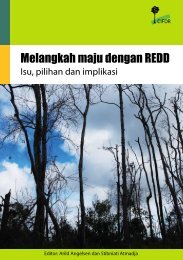Adaptive collaborative management of community forests in Asia ...
Adaptive collaborative management of community forests in Asia ...
Adaptive collaborative management of community forests in Asia ...
Create successful ePaper yourself
Turn your PDF publications into a flip-book with our unique Google optimized e-Paper software.
8 • Robert Fisher, Ravi Prabhu and Cynthia McDougall<br />
cycles <strong>of</strong> revised plann<strong>in</strong>g, action, observation and reflection (Kemmis and<br />
McTaggart 1988).<br />
Action research as an explicit methodology was orig<strong>in</strong>ally developed by<br />
the social psychologist Kurt Lew<strong>in</strong> <strong>in</strong> the context <strong>of</strong> <strong>community</strong> projects <strong>in</strong><br />
post–World War II United States (Lew<strong>in</strong> 1946). It has subsequently been<br />
applied <strong>in</strong> a wide variety <strong>of</strong> fields, <strong>in</strong>clud<strong>in</strong>g rural development, natural<br />
resources <strong>management</strong> (Fisher and Jackson 1999) and organisational<br />
change (Greenwood and Lev<strong>in</strong> 1998).<br />
Collaboration and participation have sometimes been seen as def<strong>in</strong><strong>in</strong>g<br />
characteristics <strong>of</strong> action research, with some authors specifically argu<strong>in</strong>g<br />
that all action research must be participatory (Kemmis and McTaggart<br />
1988). This is somewhat problematic. Although it is difficult to see how<br />
action research could occur without collaboration (at least <strong>in</strong> the reflection<br />
stage) among members <strong>of</strong> a core research group, it is quite possible that<br />
an action research process could occur without the active <strong>in</strong>volvement <strong>of</strong><br />
wider groups <strong>of</strong> stakeholders <strong>in</strong> the formal research itself. For this reason it<br />
seems desirable to differentiate between action research and participatory<br />
action research (Fisher 2003b). The ACM project relied on a mixture <strong>of</strong><br />
PAR, action research and more conventional extractive and comparative<br />
research to deliver <strong>in</strong>sights that would be useful and generalisable. PAR was<br />
<strong>in</strong>troduced when groups were work<strong>in</strong>g on certa<strong>in</strong> aspects <strong>of</strong> ACM, such<br />
as improv<strong>in</strong>g action plann<strong>in</strong>g or <strong>collaborative</strong> monitor<strong>in</strong>g approaches (see<br />
Guijt 2007), or seek<strong>in</strong>g to exploit an opportunity for <strong>in</strong>come generation,<br />
conflict <strong>management</strong> or forest improvement. Action research 3 was generally<br />
used to promote, implement and test the application <strong>of</strong> ACM <strong>in</strong> forest<br />
<strong>management</strong>. More conventional research methods were used for context<br />
studies, historical timel<strong>in</strong>es and comparisons <strong>of</strong> results across sites.<br />
How can we demonstrate the validity and credibility <strong>of</strong> our f<strong>in</strong>d<strong>in</strong>gs? How can<br />
we show that ACM <strong>in</strong>terventions lead to changes <strong>in</strong> the lives <strong>of</strong> poor people<br />
or the <strong>forests</strong> they depend upon? We would argue that it is not possible to<br />
conclusively demonstrate any causal connection between an ACM process<br />
and an outcome. As Hume showed <strong>in</strong> the eighteenth century 4 , causality is<br />
a major challenge for science and philosophy. Accord<strong>in</strong>g to Hume, we can<br />
only <strong>in</strong>tuit a causal connection because two events regularly occur close<br />
together <strong>in</strong> time. The challenge applies not only to qualitative research but<br />
also to quantitative research. Statistical correlation does not prove a causal<br />
relationship. Regardless <strong>of</strong> whether causality can ever be proven (a stillvex<strong>in</strong>g<br />
philosophical question), we would argue that, to show that causal
















